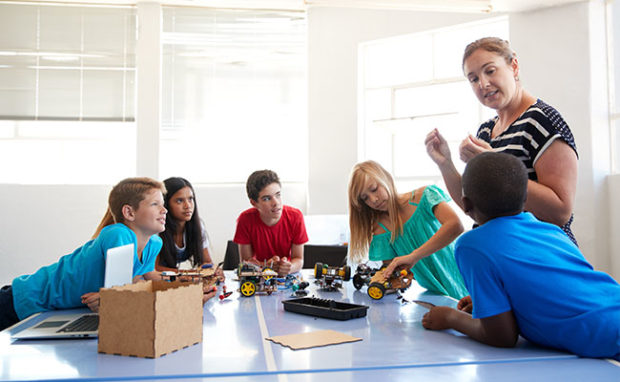After School Program: What to Look For
After School Program: What to Look For, while the word has school in it, most after school programs do not necessarily involve school work if any. After school programs are merely a way to keep children busy while at the same time help working families earn their keep. They may involve after school art programs, after school dance programs, etc.
What Is an After School Program?
An after school program is any program, managed or directed by the school, or any other party, that brings together children and youth for a meaningful task after the usual school hours.
1st Century Community Learning Center (21st CCLC) initiative is an ambitious program that has supported the creation of 456 centers that provide academic and social enrichment opportunities during non-school hours.
Have you considered enrolling your kids in an afterschool program? Well, you are not alone. Research shows that most kids of school age are likely to get into mischief and risky behavior between the hours of 3 and 6 which are just about the hours the kids get out of school. Additionally, studies go on to show that with enrolment to before and after school programs, there have been significant drops in delinquencies, juvenile detentions as well as teen pregnancies. Here are more subtle advantages to after school programs
Benefits of After School Programs

• An afterschool program would help children with homework
Most after school programs have adult supervision who can offer assistance without necessarily doing the homework for the children and youth who attend the classes. The supervisors can also point out areas where the children need extra help that teachers would have otherwise not noticed in class
• After school programs offer a sense of belonging
For children who struggle with friendships and cliques in school, after-school programs would be great ways to make untainted friendships while at the same time learning.
• After-school programs can develop the kid’s interest in non-curriculum based learning

According to data by the Afterschool Alliance, after school programs go along way in helping children develop a higher interest in STEM-based careers and learning. Some after school programs also have art teachers who help students who are interested in the art lesson.
• Building confidence

For children who do not perform well in elementary school, after school programs may be their redemption slate allowing them a second chance at a high-quality performance.
The great thing about after school programs is that they do not focus entirely on the curriculum, as such, their focus is on whatever it is your child finds fascinating. This helps to ensure that their interests are nurtured.
Clubs, dance classes, STEM classes, coding classes, school art and so on are all great ideas and matches depending on a couple of factors.
Which After School Program to Pick for Your Child?
1. The Ratio of Children to Staff
The whole purpose of an after school program is to have more supervision and more attention given to childcare. If the after-school program is one where the ratio of children to staff is high, the whole purpose is defeated. The smaller the ratio, the more likely the staff to identify any special needs or needs that should be catered specifically to the child. This should be of key priority when deciding on where to send the child.
2. Appropriate Supervision
More than the child/Staff ratio, what matters is that there is the supervision of the children, more so the teenagers. It is an undisputed fact that there is so much that teenagers or rather children can do when given the opportunity. As such, strict but positive supervision would go a long way in ensuring an atmosphere that is peaceful, but disciplined. In supervision, we expected, the kind of supervision that allows the kids to practice self-discipline all the while being aware that choices do have consequences and that in the cases where self-discipline breaks down, external discipline shall kick in.
3. Well Structured Program
The key to a good after-school program is to have it well defined, written down and approved. This minimizes contingencies and allows the management to be accountable to the parents for glitches and fall-outs. A well-defined program also cuts through to the management hierarchy as well as staff on duty, staff in charge. After all, you don’t want to leave your child in the hands of just any adult. Going the extra mile in these questions is what will keep your kids safe.
4. A positive Emotional Atmosphere
Trust your gut on this one. Is the climate positive? Does it feel right? Is there too much yelling? Does it feel like there is too much negativity? Then your child does not belong there. There have been too many studies that have shown us time and time again the connection between upbringing and psychopathy.
Make random visits. Talk to your child about how punishment is conducted. Listen to how it’s done. Do you agree with it? Can it be better? These are all things for you to consider.
5. Freedom of Choice in Learning and Play
Are the children’s voices playing a part in the games they play? Are they being heard in the decisions and the learning process? Or are they but commodities of trade?
Do they have a choice in the activities? To a certain point, children will not do anything unless forced to do so. To a certain point, however, children will explain themselves to school caregivers. Their voices, therefore, do matter, albeit in a small silent way.
Related Articles
6. Accessibility
Is the afterschool program close to the school? Can you drop the kids? Is the school bus able to easily drop them? Is the car-pool available? Can they walk home after school? Is it safe?
7. Continuity with Other Traditional School Programs

Is the after school program In the same school set-up? Are the programs aligned? Are they helping the students in the long run with college applications and life goals? Are they making the school process seamless? Is the after school art class aligned with the one in school? Is the art project in school being worked on after class? Are the art educators trained the same way? Are afterschool arts similar?
8. Affordable
Is the after-school program affordable for the parent? Does it make financial sense to invest in it? Is there a cheaper alternative to the same? Can I get it for a cheaper price ? do they offer financial assistance to families and communities that are not able to afford the program?
SUMMARY
After doing your research and weighing the pros and cons of each after school program is time to make the decision that will chape your little one.





